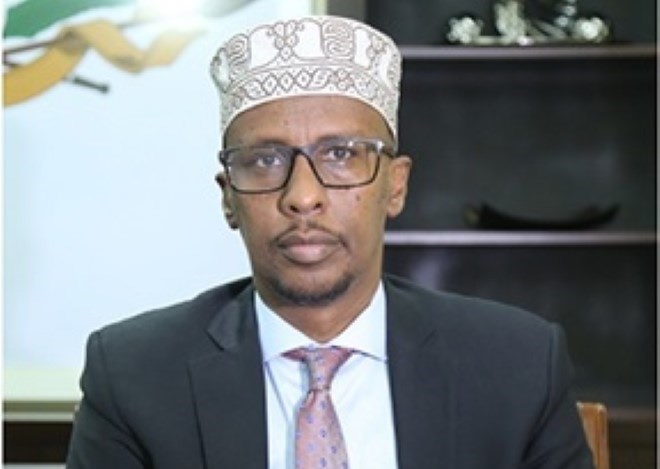
Wednesday July 28, 2021
By Shem Oirere
Photo courtesy of Somalia Ministry of Fisheries and Marine Resources
Somalia, plagued with persistent incidents of piracy and rampant illegal, unreported, and unregulated (IUU) fishing, is aiming to tighten its fishing licensing regime in order to end loopholes that result in illegal activity.
Amid claims of deep-rooted corruption within Somalia’s fishing industry, the country's Ministry of Fisheries and Marine Resources (MFMR), under the leadership of Minister Abdillahi Bidhan Warsame, plans to eliminate uncertainty brought about by each federal state in the country issuing separate fishing permits that other federal states do not recognize – creating loopholes for IUU fishing operators to thrive along the Somalia’s 3,330-kilometer coastline.
Abdullahi said the draft law on licensing incorporates the role of agencies of the federal government into that of the country's states, ensuring uniformity in the awarding of permits for fishing operations in Somalia.
“Somalia has drafted a new fisheries law that will address the gaps in the federal power-sharing system and also address the fisheries management, deals with corruption, license systems, and environmental protection,” Abdullahi said. “We are also strengthening the intergovernmental coordination within our country and with other maritime agencies.”
Abdullahi said the new law will alleviate the “confusion” that was turned into exploitable loopholes.
“The confusion caused is because of the new federal structure which, as you may know, has not yet been updated to determine where federal and state powers begin and end,” he said.
For decades, Somalia has remained a haven of IUU fishing operations and pirates partly because of lack of a regulatory framework to control fishing operations, and also a lack of capacity to enforce any legal obligations stemming from a decade-long civil war resulting in impunity for Somalia-based gangs that have thrived on piracy and IUU fishing.
In addition, the U.N.'s Food and Agriculture Organization warned Somalia does not have accurate data on the fishing operations of its small-scale fleet.
“This has made it possible for activities such as piracy and illegal fishing to thrive in the waters off the Horn of Africa region,” FAO said.
The lack of accurate and up-to-date information on Somalia’s fishing industry means both the federal government and federal states have no understanding of the country’s fishing industry value chain, and cannot effectively support the eradication of piracy and IUU fishing operations, the FAO said.
FAO, in partnership with European Union, previously supported Somalia in the registration of 3,108 out of the estimated 6,500 fishermen operating on the shore of Puntland, a federal state in northeastern Somalia. The registration, which was done through a biometrics system, captured vital personal information of each fisherman, including photographs and fingerprints, according to the FAO.
“This information will be used to develop special identity cards, which will be carried by the fishermen while at sea and will also act as a critical database for the Ministry of Fisheries, security, and anti-piracy forces, both local and international, and local fishermen associations as they gather data on the exact number and location of fisherfolk in the area,” FAO said.
Coincidentally, the push for a standardized licensing regime in Somalia comes barely weeks after a report by the Global Initiative against Transnational Crime accused the government of perpetuating illegal fishing and piracy along the country’s coastline.
“Foreign IUU fishing operations are frequently facilitated by local Somali agents, often in cooperation with government or quasi-governmental actors, who for a fee provide fishing licences, flag registrations, falsified export documentation, and even armed onboard security detachments,” the report said. “Decisions and authorizations issued by one state body are often countermanded by other agents of the state who are under the influence of a different set of private interests. IUU fishing in Somalia is in effect a public-private partnership in transnational crime.”
But the Somali government was swift in responding to the report, terming it “offensive” and “fabricated” with sole purpose of “undermining the ministry’s substantial efforts on fisheries and improvements in fisheries legislation.”
The report, the ministry countered, ignores ongoing Somali government efforts to end IUU such as “strengthening ties with maritime and fisheries organizations, paving ways for the signing of transparent agreements with foreign fishing companies that have supported the increase of the country’s productive role in fishing industry.”
Somalia blamed “cartels that we are fighting with” as instigators of the new report.